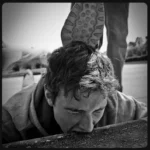Now Reading: The real meaning behind “bite the curb”
-
01
The real meaning behind “bite the curb”
The real meaning behind “bite the curb”

Every language has its own delightful expressions and phrases that have strong feelings, imagery, or cultural contexts to them. One expression that has become more popular in the last couple of years is “bite the curb”. While it is not necessarily a phrase used in everyday conversation like some other idioms, many Australians would have heard of the phrase through film, television, online talk, and/or gaming communities.
This article explores what it means, where it comes from, and why it continues to be a debated topic.
What does bite the curb mean?
Ultimately, “bite the curb” describes an act of active violence where someone’s mouth is forced against a street curb, and then stomping is initiated. It is graphic and dangerous because it can cause serious injury.
- Literal meaning: A person’s teeth or jaw are pushed against the edge of the kerb (American spelling “curb”).
- Figurative meaning: Other than the actual act, the phrase may be used figuratively as someone being defeated, embarrassed, or severely punished.
For Australian hearing this phrase for the first time, it is important to acknowledge both the violent meaning or origin and its symbolic meaning if someone is engaging in a conversation around the phrase, either online or within a media platform.
Origins of the phrase
The phrase “bite the curb” became popularized since it was featured in the unsettling movie American History X, which was released in 1998. Some claim that the act existed in American gang culture before the film, but it was Hollywood that popularized it.
Since that time, the term has come back in:
- Movies and TV that portray gang violence.
- The lyrics of music are used metaphorically.
- Online memes and TikTok have spread slang worldwide.
- Video games and forums are used by gamers as hyperbolic trash talk.
Although Australians are likely to come across the term mostly on the internet, it still remains an American cultural reference.
How do Aussies interpret the phrase?
While “bite the curb” isn’t a common Aussie slang term, many people recognise it through popular culture. You might see it pop up in:
- TV and film – References in pop culture or memes make the phrase widely known, but no individual has used the phrase directly.
- Sports banter – Sometimes Australians use the figurative version of the phrase to suggest one team has absolutely dominated another team, e.g., “they really smashed them” in rugby league or AFL for example.
- Online discussions – People will occasionally use the phrase in very exaggerated jokes on memes or discussion forums.
Is bite the curb offensive?
Due to its violent visuals, the phrase can be viewed as inappropriate or unsettling in certain contexts. Australians tend to be straight-talking and cheeky, but it is still important to be responsible with your language use:
- Do not use in work or family situations.
- Be aware that not everyone will understand the figurative meaning.
- Instead, use “smashed,” “demolished,” or “wiped out,” if used in casual conversation.
Cultural impact and relevance
Although “bite the curb“ is not an pleasant phrase, it nevertheless demonstrates how phrases from a movie, media, or digital culture become common speech. Australians will find it helpful for:
- Pop culture literacy – Understanding cultural references from global films and series.
- Digital conversations – Engaging with friends in forums or in gaming, where a non-Australian uses the phrase.
- Language awareness – Understanding the impact that extreme imagery (the phrase is grounded in violence) will create, and the person’s or audience’s communication philosophy.
Is bite the curb Australian slang?
That’s not really the case. Australians don’t really use the phrase in everyday chatting. It’s an imported phrase and has probably seeped into Aussie vernacular via movies, online games, and memes that are international.
That said, we know Australians pick up on global slang quickly (based, simp, gaslighting, etc.). “Bite the curb” has become the norm, particularly for younger Aussies who are online all the time.
Metaphorical use of bite the curb
Beyond its literal meaning, it is often also used in a figurative sense. In this use, it refers to not a physical assault, but a humiliating or vitriolic defeat.
For example:
- Sports: If the Wallabies had their lunch handed to them in a rugby match, opposing supporters may declare they were “made a bite the curb.
- Work banter: In an office trivia competition, if one team did not win but dominated the competition. Colleagues may jokingly say they “made them bite the curb.
- Gaming: If an Aussie is at the computers on Xbox or PC, he or she may jokingly declare they “made their buddies bite the curb” after they obliterated them.
Why should Aussies understand the context?
Like many slang terms borrowed from other cultures, the phrase “bite the curb” comes loaded with both seriousness and humor, depending on its use. Australians who see it online should keep in mind:
- The origin is violent (American street culture/film).
- The slang application is generally metaphorical (getting defeated or humiliated).
- The tone is everything—using it jokingly with friends in gaming is far from using it jokingly in a formal context or among an Aussie social casual setting.
Safer alternatives Aussies use
Instead of pulling out an expression that might upset the recipient, here are some common everyday Aussie alternatives:
- “Got smashed” – Very common in sports talk.
- “Clean sweep” – when someone wins outright.
- “No contest” – when it is pretty obvious.
- “Flat out beat” – a more neutral approach.
Key facts Australians should know
- The phrase originates from the 1998 film American History X.
- Its literal act is violent and not something to joke about in serious instances.
- The phrase has reemerged in internet slang, most commonly in gaming and memes.
- Australians will deal with the term online more than in real-life situations.
- The slang application means “to crush, humiliate, or dominate”.
Conclusion
For Australians, the phrase “bite the curb” is more about tracking its provenance, meaning, and cultural significance than using the phrase. Whether that appearance is a social media meme, a movie discussion, or even an online game, providing context helps people to avoid ambiguity or confusion about what it is about.
Like many slang derivatives, this one reminds us how language travels across borders— mediated in ways by media, pop culture, and online communities.


























